By Shelli Kimmel
My mother, Annemarie, was born in Vienna on October 1st, 1922, the only child of Elsa and Paul Klauber. Her parents had moved from a place unknown in Czechoslovakia to Vienna when they got married, and lived as a wealthy and assimilated family, enjoying the many cultural offerings of the city.
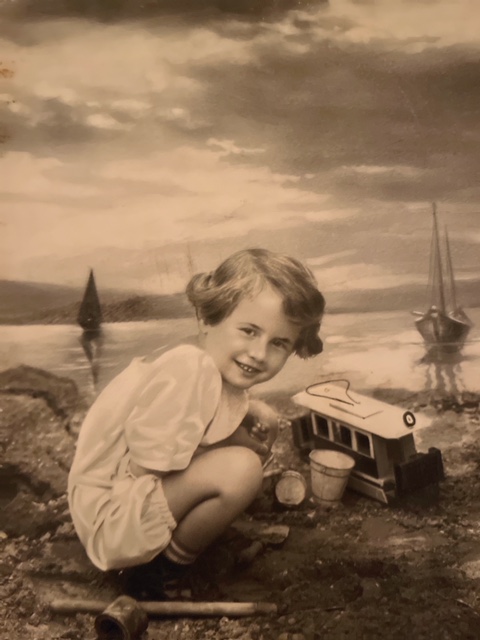
Following the annexation of Austria into Nazi Germany in March 1938, Fritz Grϋnbaum*, a close family friend and a very political performing artist and outspoken anti-Nazi, was arrested and taken to Dachau. Seeing the writing on the wall, Annemarie’s parents sent the sixteen-year-old to England in December 1938 on one of the first Kindertransports. Paul Klauber died in April 1939 because, as a Jew, he was denied his life-saving diabetic medicine.
After Paul’s death and prior to the war starting, and with her daughter safely billeted, a plan was devised for a host family in England to bring Elsa there as a caregiver to an elderly relative, but that was not to be. There were several versions of this story. One was that the elderly relative’s cognitive functioning was impaired, and she got it into her head that the application was all a mistake and said so to the authorities, who cancelled it. By the time the host family found out and went to the office to straighten out the misunderstanding, it was too late for Elsa to depart.
Elsa refers to this in her last letter: “You were the best child and you have done for me all you could do. In 1939, only a few days prevented me from being with you.” It is heartbreaking to think how close she came to escaping. My mother never spoke about this. I often wondered whether she buried it deep in her consciousness because she couldn’t live with the knowledge, or whether she was never told about the attempt to rescue her mother and perhaps was puzzled by what Elsa meant.
Fritz’s wife, Lilly, and Elsa then lived together in Vienna, moving to a number of different apartments. In 1941, their attempt to flee to Shanghai was unsuccessful and on October 5th, 1942, they were deported to Minsk and then murdered in Maly Trostinec, a death camp near Minsk, on October 9th.
Annemarie had arrived in England on December 12th, 1938. While most trains went to London, a few, including the one my mother was on, went further north. She began her years in England at Dovercourt, a summer holiday camp turned refugee camp on the east coast. Shortly after, she was sent to Manchester, where she impressed one of the sponsors of the refugee program who happened to be a prominent member of the Manchester Jewish community. He decided to foster her and brought her home to join his family. She became close with the older daughter who was near in age and with whom she shared a room. There were two other children, a son, and a much younger daughter. Annemarie desperately missed her own family and wanted badly to become part of this one.
Research and survivor testimony have shown that the living conditions of children from the Kindertransport varied from being warmly welcomed and included in a family to being worked hard, treated as a servant, or abused. My mother’s experience was somewhere in the middle. There were issues in the family, and she was not welcomed or wanted by the mother, who treated her terribly, but she was loved and included by other family members. After several years, when she was old enough to begin working, Annemarie was sent to live with a spinster aunt. She found a job, began volunteering in the Women’s Fire Brigade, and got involved with a group of women who were organizing teas for Jewish servicemen. It was at one of these teas that she met my father, Herbert Wittes. After a short courtship, they were married in December 1944.
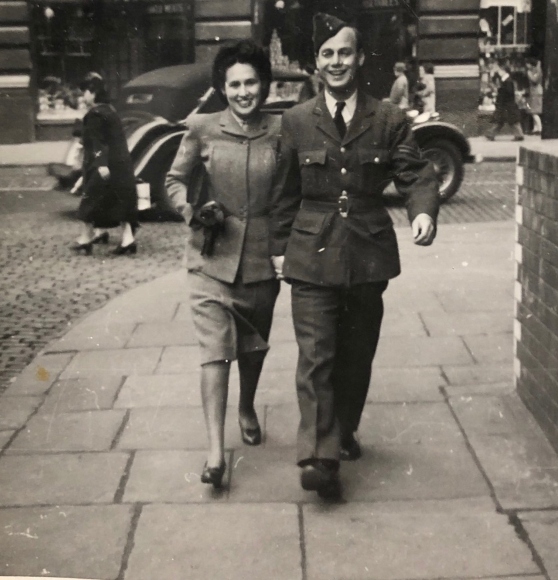
In the spring of 1945, as the war came to an end, my mother made the journey to Canada on her own to meet her new family, as my father was not yet released from the Canadian Air Force. She arrived in Montreal at the tender age of 22, once again uprooting the life she knew and starting anew. My father’s family welcomed her with open arms, for which she was always grateful. His parents became her parents, his siblings became hers.
As I was growing up, my mother never spoke of her departure from Vienna, what it had meant to her nor how she felt. Did she not want to burden us with her past, or was she desperately trying to forget it? She also never spoke German other than one lullaby I clearly remember her singing to me. After her death in 1995, my siblings and I found the last letter her mother had written to her, which answered some questions but created more. One line resonated strongly with us: “Forget you ever knew the German language!”


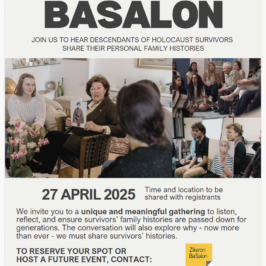


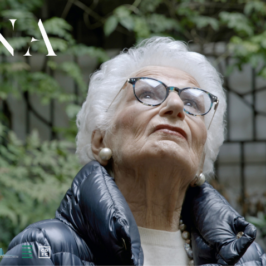
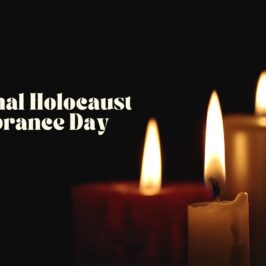
Linda Graupner
Hi Shelli! My name is Linda and I just read your story about your mom in the Citizen this morning. It just happens that my father, still living here in Ottawa, is a Kinderstansport survivor, so I was very interested in the upcoming exhibit at City Hall and would like to get my father involved, or at least to visit the exhibit. I hope that we can meet or talk on the phone.
Evelyn Greenberg
How inspiring to learn the life story of your mom, Shelli. What a brave young lady and a role model for all. Knowing you, I am reminded that the apple does not fall far from the tree. You are among the most admired and respected young women in Ottawa. Your dedication to our Jewish community has always been inspiring. I salute you and your dear mother. Evelyn Greenberg